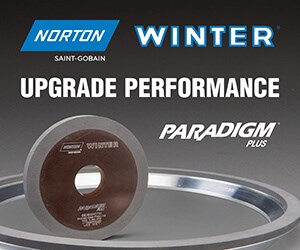The Capacity Close By
MakeTime offers a model for connecting OEMs’ manufacturing needs with the capacity shops have available.
Drura Parrish shares an anecdote that made an impression on him, because the inefficiency it illustrates highlights the value that he hopes OEMs and machine shops will see in his recently founded business. During a recent shutdown of a West Coast port, he says, the Midwestern U.S. plant of a foreign-owned automaker was cut off from its source for various machined parts, including many simple, non-critical components. These inexpensive parts were sent by air freight to keep the plant producing, even though there were probably 100 machine shops within a short drive of the plant that could have made these parts instead. Why?
Of course, there are several reasons why it was impractical for the automaker to turn to local shops, as near as they might have been. Even if the company could identify which of the local shops had the right kind of capacity, the OEM still would have no way to quickly determine which of those shops do quality work and which were effective at delivering within tight schedules. And of all the shops meeting those requirements, some would no doubt be too busy to take on the automaker’s work. Thus, even though there might be a large number of prospective suppliers nearby, finding the right shops out of those prospects would require so much searching, vetting and quotation that air freight was arguably the better choice.
However, what if these sorts of questions about prospective suppliers could be answered in advance?
What if available capacity in nearby shops could be seen and spoken for as it was needed?
Mr. Parrish’s firm is MakeTime (maketime.io), an online “distributed manufacturing” marketplace that launched last year. Different from an RFQ site, MakeTime’s model involves bidding on available machine capacity rather than bidding on parts. That means it is a service only for knowledgeable buyers who understand a job’s manufacturing needs well enough to be able to guess the type and amount of machine capacity required. Further, MakeTime’s marketplace includes only those shops that MakeTime itself has interviewed and evaluated, and is willing to stand behind with a guarantee to the buyer.
Founder and CEO Mr. Parrish grew up around machining. His grandfather and father worked for a family tool and die business in Kentucky. When he set out on his own career, he left this work behind—or so he thought. While serving as a vice president for a West Coast company specializing in design and prototyping, he routinely engaged with small machine shops, and he recognized the value of the capacity in these shops that was going unused. Visiting a mold shop one day that he held in high regard, he asked, “Can I buy an entire month on one of your machines at a cost-plus rate?” His idea was that he would sell this capacity to OEMs he knew or sought out. It worked.
Other shops joined him. Some would call him with capacity to sell because business was slow during a given month. Mr. Parrish says the group got big enough that there were certain moments when his network of resold capacity had more machine tools running at one time than one of the larger job shops in southern California. Yet the part of the model that he couldn’t scale was his own effort in finding and selling to OEMs. An investment banker looking dryly at what he was doing asked, “Have you ever heard of the Internet?”
The new company, MakeTime, represents something like this capacity-based model coming to the Internet. The Kentucky-based startup manages an online marketplace in which machine shops see buyers’ requests for specific capabilities and machine time. For example, a request might take the form of “20 hours of milling and drilling stainless steel parts 15 inches long.” A shop can submit a bid with the price it would charge for this work. Messaging between buyer and seller then further defines the details of the job once a bid has been tenatively accepted, and serves as a record of the agreement. Despite the direct interaction, however, Mr. Parrish still has an extensive hands-on role.
He personally interviews every supplier seeking to join the marketplace. This is part of an evaluation process for suppliers that also includes a tour of the shop by a member of the MakeTime staff—every potential supplier gets this visit. “We also interview references, look at ISO certification and learn about recall and bringback rates,” Mr. Parrish says. Out of that list of indicators, he says rework is one of the most telling clues about the way a shop performs.
The information is significant because MakeTime attracts buyers to the network by guaranteeing machine shops’ work. If the parts delivered are not satisfactory to the buyer and the shop can’t fix the problem, then MakeTime has a stable of suppliers on standby that it will call upon to run the job. This is an extreme and costly contingency that the company seeks to avoid simply by letting in only shops that are very good.
But a large portion of shops fit that description, he says, because shops in recent years have had to be very good. Market conditions of the past decade have weeded out poor performers, so the shops that have come through this period tend to be high-caliber. Thus, part of his message to OEMs is this: There is good capacity out there. Currently, MakeTime has about 4 million hours of available capacity in its marketplace, and it could have even more, except the company targets a particular buyer-to-seller ratio (1:3) and limits supplier growth to maintain this.
Among OEM companies, the trend in recent years seems to have been toward insourcing. Mr. Parrish has seen this. I have, too. Companies have brought more of their manufacturing into their own facilities. The step is warranted in many cases, as the OEM recognizes the value of taking better control of the timing and quality of its production, not to mention the value of keeping manufacturing and product development close. Still, are there often cases in which insourcing is an unnecessary expense? Mr. Parrish believes so. Unknown to the OEM contemplating this move, there might be a variety of shops nearby that are not only ready to do this customer’s work, but also capable of doing it even to exacting timing and quality needs.
Read Next
3 Mistakes That Cause CNC Programs to Fail
Despite enhancements to manufacturing technology, there are still issues today that can cause programs to fail. These failures can cause lost time, scrapped parts, damaged machines and even injured operators.
Read MoreThe Cut Scene: The Finer Details of Large-Format Machining
Small details and features can have an outsized impact on large parts, such as Barbco’s collapsible utility drill head.
Read More
.jpg;width=70;height=70;mode=crop)





.png;maxWidth=300;quality=90)








.png;maxWidth=300;quality=90)




